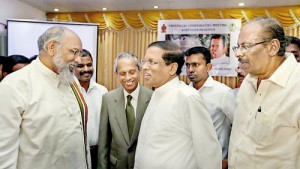News
CEPA to remain on the backburner
Contrary to belief that the new Sri Lanka regime would take a more pragmatic approach and revive discussions on the long-delayed Comprehensive Economic Partnership Agreement (CEPA) with India, a firm commitment last week from President Maithripala Sirisea has relegated this proposed deal, back to dusty, old cupboards.

President Maithripala Sirisena during his recent visit to the North in conversation with Chief Minister for the northern province C.V.Wigneswaran at the Jaffna District Secretariat.
Over the years, the proposed CEPA drew criticism from local business interests, many of whom were seen as powerful backers of former President Mahinda Rajapaksa, and negotiations were thus suspended more than five years ago. The concerns were essentially that it would open the floodgates for thousands of Indians to work in various service sectors including the medical profession, reduce wage rates and thereby demand for local workers.
CEPA didn’t figure in the recent discussions in Delhi between the Sri Lankan President and Indian Prime Minister Narendra Modi, and at Indo-Sri Lanka trade talks this week in Colombo with a delegation led by Indian Commerce Secretary Shri Rajeev Kher. It is also unlikely to come up in any meetings with Indian External Affairs Minister Sushma Swaraj, who commenced a visit on Friday, and local officials.
At a February 28 meeting hosted by the Chamber of Young Lankan Entrepreneurs (COYLE) in Colombo, the President had said the issue of CEPA didn’t come up in his recent Delhi visit because it was not on the agenda.
While COYLE in a media statement, said the President had said he will not enter any agreement with any country that will be harmful to local businesses,” Samantha Kumarasinghe, Chairman/ Managing Director, Multichemi Group of Companies, who was present at the meeting told the Sunday Times, that the President had given assurance to entrepreneurs that he will not go ahead with CEPA which was suspended sometimes back and also that no deal will be signed with a foreign country that would jeopardise local industries and services.
Mr. Kumarasinghe, one of those who objected to CEPA and is said to be close to the former President, emphasised that even under the Indo-Lanka Free Trade Agreement (FTA) Sri Lankan businesses could not, even if allowed, freely access Indian markets.
A Colombo-based trade specialist noted that the CEPA proposals formulated more than six years ago are now outdated. “If it is to be revived, it needs a serious review and overhaul,” he said.
Commerce Department Director General R.D.S. Kumararatne told the Sunday Times that CEPA is now out of the scene and has not been discussed at Indo Lanka top level meetings on trade and commerce in recent times.
CEPA was concluded way back in 2008 after 13 rounds of negotiations between the two countries and was stalled in 2011 as a result of strong protests by local industrialists.
Mr. Kumararatne said that removing non-tariff barriers and enhancing trade and investment are the priorities of Sri Lanka with India and such issues could be addressed via the existing Free Trade Agreement (FTA).

